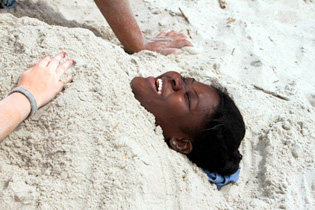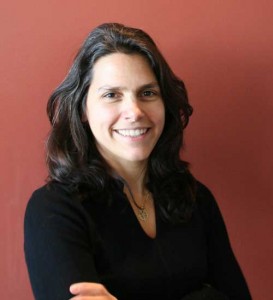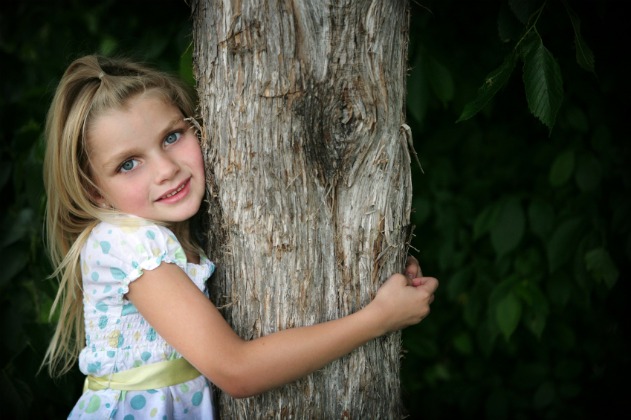 LEAF participants enjoy an afternoon at the beach after a morning of work at the Conservancy’s Cape May Migratory Bird Refuge in the Delaware Bayshores region.Photo: Erika Nortemann/TNCCross-posted from Cool Green Science.
LEAF participants enjoy an afternoon at the beach after a morning of work at the Conservancy’s Cape May Migratory Bird Refuge in the Delaware Bayshores region.Photo: Erika Nortemann/TNCCross-posted from Cool Green Science.
Want your kids to become ecologically conscious as adults? Get ’em into nature now — that’s the most reliable way to build their love of the outdoors, according to mountains of research.
But in a harried and always-online world (for parents as well as children), what’s it going to take to do that?
One way: Find a program with mentors who guide them through the wonders (and occasional terrors) of the outdoors. That’s the conclusion of a new study of urban youth commissioned by The Nature Conservancy and funded by the Rhodebeck Charitable Trust and the Toyota USA Foundation.
The study looked at alumni of the Conservancy’s Leaders in Environmental Actions for the Future (LEAF) program, a summer stewardship program that puts urban youth attending environmental high schools into paid residential internships doing environmental work on Conservancy preserves across the United States.
LEAF participants are mentored throughout their internships by naturalists and conservation scientists — and the results over the 17-year span of the program are pretty amazing, say researchers:
- LEAF alumni place greater value on environmental issues (for instance, 73 percent rank “global warming” as “extremely serious,” compared with 37 percent of their peer group nationally); are much more likely to volunteer for environmental groups; and are much more likely to point out “un-ecological behavior” to others (like littering).
- They spend as much time outdoors on a typical day as they do watching TV, playing video games, or using computers.
- Parents should like these next two a lot: LEAF program alumni matriculate to college at rates more than 26 percent higher than average for their peer group nationally, and they’re much more likely to graduate high school.
- They’re also more often in full-employment jobs and earning more money than their peer group averages.
Can parents build on these findings for their own children, even if there isn’t a LEAF program near them? I put that question and others about how to get today’s kids into nature to Patricia Zaradic, director of the Red Rock Institute and lead author of the LEAF survey report.
 Patricia Zaradic.Q. So what is it about LEAF that’s producing these sorts of results — these increased rates of graduation and volunteerism and good-old-fashioned nature-loving behavior?
Patricia Zaradic.Q. So what is it about LEAF that’s producing these sorts of results — these increased rates of graduation and volunteerism and good-old-fashioned nature-loving behavior?
A. The program gets these teens outdoors working one-on-one with mentors and conservation scientists in nature for an extended period of time, and that’s absolutely important. They build life and work skills in the program. They also spend time gaining self-reliance in a setting where they feel at peace, where they can build communities with a diverse population of peers and conservation practitioners. And they get time for self‑reflection, personal growth, and confidence-building by living independently in a totally new environment than they are accustomed to. Those are skills that give them a leg up preparing for college life. It’s a really good mix.
Q. Why do they need mentoring? Why not just throw them out there — wouldn’t that teach resilience?
A. A number of studies have shown that, when you take kids who live in urban settings and you put them in a rural, natural setting, their first experience isn’t necessarily going to be a good one. It’s often just because they are being confronted with strange sensory inputs — different smells, different textures, general differences in the environment. Having a mentor that helps introduce youth to these outdoors settings and experiences is very important. They feel more comfortable and come to regard the outdoors as a place that they can feel at home and enjoy.
Q. Remind us: Why is it important for kids to get outside and into nature? What does the scientific literature tell us about the benefits?
A. Science has documented both physical and psychological health benefits to being in nature. Kids in nature tend to be more active, which brings physical well-being. Psychologically, there are long-term benefits in dealing better with stress and becoming more resilient to challenges.
The LEAF program really helps with both. Graduates of LEAF are continuing to spend time in nature, and that might in part explain why they’re more successful in school and in life. And the mentored outdoor work LEAF provides them keeps them very active and teaches them to use the outdoors recreationally in ways they didn’t know about before. In addition to health benefits, the work-based nature of the program may open their eyes to career paths in environmental fields.
Q. What else impressed you about from the study?
A. How the LEAF graduates — who are now adults — are continuing to spend more time in nature even years after their initial summer experience. How these individuals truly become conservation advocates and act on that belief.
They are volunteering for environmental organizations at extremely high rates compared to national averages. And they continue to hike and backpack and spend time outdoors at much higher rates than their overall peer group — and much, much higher rates as compared to their peers in similar ethnic groups. So I think the program has done its work incredibly well.
Q. But how do you measure the impact of the LEAF summer program alone from the impact of the internship plus the environmental curricula these kids are already learning in their high schools?
A. It is hard to tell. LEAF is part of a broader partnership with urban environmental high schools that support the students with environmental lessons during the academic year. That partnership is designed to complement and amplify the outdoor summer experience. But the graduation rates and the college‑bound rates for the LEAF interns are even higher than the overall average for students at the participating schools.
Q. But despite all these benefits, you found that the LEAF graduates lagged the national average of people their age who identify themselves as strong environmentalists. Why are they refusing that label?
A. I can only speculate on that. But I can say there is a stigma for some people around being labeled an “environmentalist.” For all intents and purposes, these kids have the attitudes and behaviors that are consistent with very strong environmentalists. But there are historical stereotypes of what it means to identify yourself as an “environmentalist,” stereotypes that may not appeal to these diverse, urban youth.
Q. Final question: Educators and parents — especially ones who might not have access to a structured program like LEAF — what should they take away from all this?
A. For educators: All education programs would benefit from outdoor access and sustained outdoor access — elementary, middle school, high school, college. Educators should look for ways to integrate ongoing outdoor participation into any kind of education program that is going on. If you can manage sustained outdoor exposure, particularly in the company of a mentor who is somewhat familiar with the outdoors, I think that we’re going to be able to raise a new generation of more active, more resilient, more psychological and physically healthy kids that will steward nature well and have a much better chance of addressing the environmental issues we face today.
For parents: Parents should know that they don’t need a structured program to help their kids get more comfortable in nature. Just spending time with your kids in some kind of outdoor setting is a good place to start — your backyard or your neighborhood park. Right now there are a lot of outreach programs and even community and spring clean‑ups that can facilitate the process with very little cost.
Here’s something else parents should know: These LEAF graduates are doing much better in terms of employment and income than the general population of 18-to-24 year olds. So if you’re wondering, “How do I give my kid a leg up in the world?” — getting them outdoors might be part of the answer.



